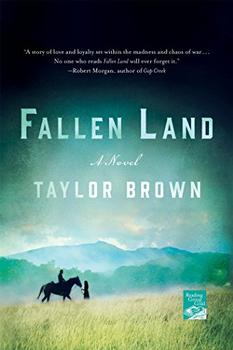Summary | Excerpt | Reading Guide | Reviews | Beyond the Book | Readalikes | Genres & Themes | Author Bio

The boy put the palm of his hand against the girl's belly to push her behind him, and her waist was as tiny and delicate as his idea of what was fragile in the world.
"No," said the boy to the sharecropper. "No."
The man kept coming.
"No."
At last the boy lunged, unsheathing his knife, and a white crack exploded inside his head, and dreaming or dying he felt his blade plunge into the liquid underbelly of all that might have happened. All that would have. He saw her eyes come over him, blue-rimmed, the pupils deep and black and wide as wells. All for him. Then darkness.
* * *
Hands upon his face, his brow. Palms smooth. Tough but smooth, callus-shaven. No scratching, no frictive grit. A voice like running water. The layers that bound him were cut away, piece by piece, until he was naked, unwooled, committed to dark.
In and out for hours, days. Drifting. Sometimes there were voices over him, whispers and orders he could not decipher. He floated in a world his own, dark with nightmare. Dreams of his past, fevered, like the night of the wreck. The men he pushed under, the men who pushed him. Ladders of them, limb-conjoined, wanting for air. The spouts of exhalation, gargle-mouthed. The groan of the ship sinking beneath them, sucking them under. The white jet of expelled air, last of the pockets that saved him, shooting him to the surface, white-birthed.
Then and now black-whirled. Nightmare and memory.
The ship gone, the waves high. The pale slit of coast, like snow. The beach underneath his feet, his knees, his face. Then the lopsided shack, the man called Swinney who nursed him on fish and whiskey, who took him in as a father might, and then the Colonel, who took them all. After that the land grown mountainous, and meaner, and scarecrow men who haunted the ridges, and rib-boned horses beneath them, and always the hunger, insatiable, and the wagons raided, and the barns and the farmhouses, and never so much blood.
With these fever dreams came the vomiting. Hot on his chest, aprons of himself expelled. Sickness and sweat and instruments on his skin, metal-cold.
One day he could hear the words of the men over his sickbed:
"How long's he been like this?"
"Couple days. Took that long to find you."
"How old is he?"
"Couldn't really say, Doc."
"He's hardly even whiskered."
"Well."
"Well, where did he come from?"
"Shipwreck off the coast, blockade-runner."
"Immigrant? Another Irish, with sympathies?"
"Could be. What's that matter to you?"
"Niggers turned inside out is what they are. They don't fight for us."
"This one does."
"Well, he won't be fighting for anything, this swelling doesn't diminish."
"You best hope it do, Doc."
"Shall I, Mr. Swinney?"
"Otherwise you might find yourself there beside him. Untongued."
"Where is your commanding officer?"
"Don't you worry your head about it."
"Where is he?"
"With the girl. And you, Doc. You with me."
Days later the sickbed gone, the house, too, his world beginning to sway and totter beneath him, uncertain of step. It expanded and collapsed and sweated and snorted, a ribbed joinery articulating beneath him as though the surface of the world had sprung from engines hot and deep beneath the soil and rock.
Sometimes he could not sit the horse, too dizzy, so they laid him belly-down across the torso of a horse with no saddle, his head lying against one of the flaring sides. In daylight, the sun leered sickeningly above him, the trees all warped and gnarled, the world ugly and pale and mean. He shut his eyes against the light. Nightfall, he was led stumbling to void himself in the trees, liquid and quaking. A round man, gone strange to him, leading him by a length of rope.
Swinney, he realized.
He came back into the world but slowly. The ground growing more certain, the light less painful. The dreams shorter. The pain duller. Then he was back in it, all at once, and it was hunger that brought him. He awoke on the back of the horse. The light was slanted, late afternoon, and he had never been so hungry. He tried to wrestle loose and found himself rope-bound to the animal like a sack of feed or beans or other provision.
Excerpted from Fallen Land by Taylor Brown. Copyright © 2016 by Taylor Brown. Excerpted by permission of St. Martin's Griffin. All rights reserved. No part of this excerpt may be reproduced or reprinted without permission in writing from the publisher.
Your guide toexceptional books
BookBrowse seeks out and recommends the best in contemporary fiction and nonfiction—books that not only engage and entertain but also deepen our understanding of ourselves and the world around us.